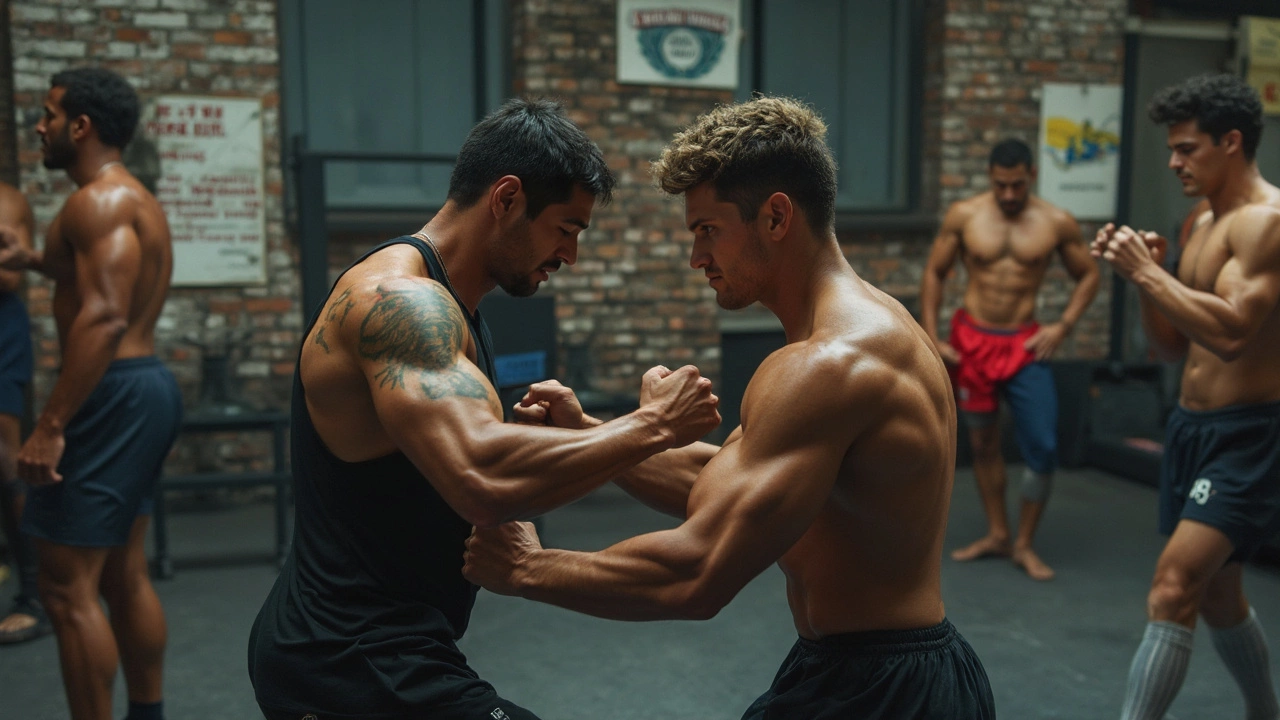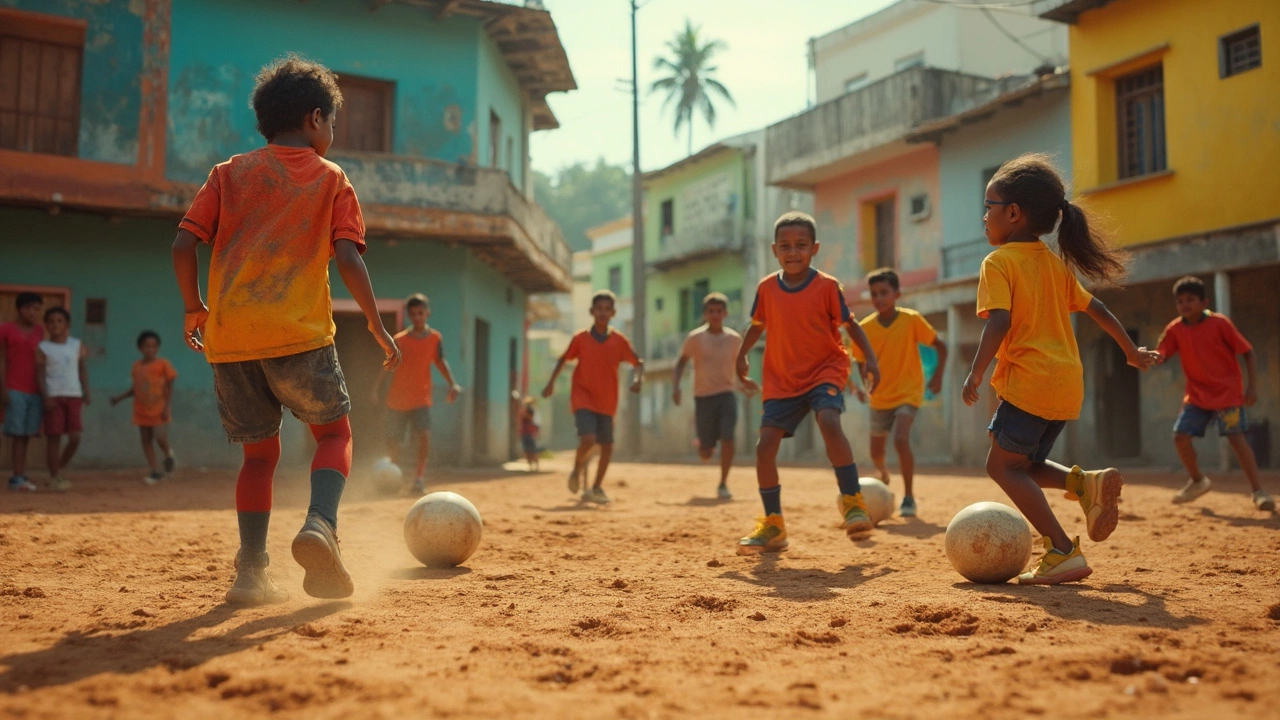Try imagining a country where sports talk isn’t just at the water cooler—it’s everywhere, from packed cafes to every street corner. That’s Brazil for you. They don’t just cheer from the sidelines; most kids kick a ball before they even turn five. And it’s not just football. Volleyball, basketball, judo, and now even rugby have serious followings, with fans tracking every fixture and result like it’s the most important news of the day.
If you’re into rugby—maybe you’re running fixtures, coaching, or just obsessed with the sport—it pays to look at what makes Brazil tick. Their athletes don’t just appear out of thin air. There’s a whole system that starts at the playground and never really stops. If you want your team or league to get better, or if you’re trying to figure out how to build a sports culture that works, copying a few Brazilian moves makes sense.
- All In: Brazil’s Passion for Sports
- Grassroots to Greatness: Building Talent Early
- Training That Actually Works
- The Support System: Family, Fans, and Funding
- What Rugby Can Steal from Brazil’s Playbook
All In: Brazil’s Passion for Sports
If you ask anyone in Brazil about sports, you’ll get more than just a casual answer. It’s part of their everyday life. Forget the old stereotype that “it’s all about football”; people watch and play all sorts of sports, from volleyball in Rio to street football in São Paulo, and now you’ll even spot kids passing a rugby ball in Recife’s parks. The real secret? Brazilians don’t need fancy facilities to get moving—public spaces, beaches, alleys, and any open patch of ground turn into arenas. This wide-open attitude helps everyone, no matter where they live, jump into sports early and often.
Brazil hosts major sports spectacles all the time. Every year, you get events like the Brazilian Volleyball Superliga filling stadiums, and national football matches breaking TV ratings again and again. When Brazil hosted the Olympics in 2016 and the World Cup in 2014, millions hit the streets to watch together. This experience cemented the idea: in Brazil, being a sports fan isn’t just a hobby—it’s a shared social anchor.
Here’s something you’ll notice quickly: passion equals participation. Check out this quick breakdown from recent national survey stats on how Brazilians get involved in sports:
| Sport | Participation Rate (%) |
|---|---|
| Football (Soccer) | 55 |
| Volleyball | 15 |
| Basketball | 7 |
| Rugby | 3 |
| Others | 20 |
Even though rugby’s slice might look small, its recent growth is eye-opening. Brazil’s men’s and women’s national rugby teams started qualifying for world events only in the last decade, but the audience for Brazil sports just keeps expanding. Whenever there’s a fixture on TV, more families start tuning in, making rugby a household word in big cities and remote areas alike.
Brazilians don’t just consume sports—they celebrate it, live it, and it’s totally normal for a child to dream of playing at Maracanã or an Olympic venue. That love and energy spills into every game and makes all the difference, even for up-and-coming sports like rugby.
Grassroots to Greatness: Building Talent Early
Kids in Brazil are surrounded by sports almost from birth. A lot of schools run after-class football and volleyball programs, but public parks, beaches, and even alleyways turn into makeshift training grounds. The rule here is simple: if there’s space to play, there’s going to be a game happening.
The Brazilian approach to spotting and building athletes gets serious before you might expect. Take São Paulo, for example. The city has more than 1,500 public sports centers, and in Rio, local clubs scout kids as young as six. Rugby, while newer, is catching up—dozens of clinics pop up every year, and rugby isn’t just for the big cities anymore. Smaller towns are setting up youth teams and training tournaments, hungry for their own share of the action.
These clubs and academies don’t just look for kids with fancy moves. They run basic skills assessments, track attendances, keep tabs on kids showing up every day. And there's support—not just for the future professionals but for everyone who wants in. No one gets left behind if they’ve got the drive.
To put things in perspective, take a look at some numbers:
| State | No. of Youth Sports Programs (2024) | Active Rugby Clinics |
|---|---|---|
| São Paulo | 1,500+ | 79 |
| Rio de Janeiro | 1,200 | 54 |
| Minas Gerais | 900 | 41 |
Getting kids started early means more time to develop skills, build confidence, and, honestly, just fall in love with sports. For anyone trying to boost Brazil sports success in things like rugby, the tip is simple: start small and start early. Get that ball in every kid’s hands, and make the game easy to join, wherever you are.

Training That Actually Works
Brazilians don’t just train hard—they train smart. It’s not about endless laps or brutal drills for show. Their coaches stick to what really works. A lot of their top clubs and academies use up-to-date sports science, including basic data tracking like heart rate monitors and GPS vests, to keep tabs on every athlete’s performance. It sounds fancy, but even local clubs have access to this tech because the country made a push to put it in reach of regular people, not just pros.
Something you’ll notice if you watch Brazilian teams right before fixtures: they don’t obsess over perfection in practice. Drills mix real-game chaos, so players learn to make good choices in messy situations. Rugby teams, for example, copy the way footballers learn to stay loose, react on the fly, and communicate fast. Mistakes are part of the plan, not a disaster—just a reason to try again.
Strength and conditioning are huge, but so is agility. From a young age, Brazilian athletes run ladder drills, side shuffles, and short sprints, not just heavy lifts. This combo means rugby players (and anyone else) can move quickly and change direction, not just bulldoze straight ahead. That edge shows up big time in matches.
Here’s the practical side—if you want to get more out of your training, think about these Brazilian habits:
- Mix in live, game-like drills that force quick decisions.
- Use basic tracking tools (even simple stopwatches and phone apps help).
- Don’t punish mistakes during practice—turn them into feedback moments.
- Balance strength workouts with moves that build speed and flexibility.
- Give players ownership—Brazilian athletes often set personal mini-goals for every session.
It’s not magic. But the way they train makes Brazil a sports powerhouse, and rugby fixtures everywhere can learn a thing or two from that.
The Support System: Family, Fans, and Funding
You can’t talk about why Brazil punches above its weight in sports without digging into how much support athletes get from every angle. Family is the first cheer squad. Most young prospects get their main push from parents who drive them to games, scrape together money for gear, and act as unofficial coaches and therapists—sometimes all in the same week. It’s completely normal to see whole families at local matches, even if it means long bus rides and sacrificing weekends.
Then come the fans. If you ever watch a Brazilian match, you’ll notice stadiums aren’t just filled—they’re alive. Even less popular fixtures like rugby find themselves packed with chanting, passionate crowds. In fact, during the 2016 Olympics, rugby sevens tickets in Rio sold out three days straight, beating sales projections by 40%. The energy from the stands isn’t just hype, it creates pressure that makes athletes step up their game and feel valued no matter the result.
Funding is trickier. Most resources go toward football first, but other sports like volleyball, judo, and now rugby have started seeing increased investments thanks to public and private partnerships. The Bolsa Atleta program, launched in 2005, gives monthly stipends to over 6,000 athletes a year so they can train full-time without worrying as much about bills. Here's how the numbers stack up for sports funding in Brazil:
| Sport | Avg. Annual Funding (USD) | Major Sponsors |
|---|---|---|
| Football | $300 million | Banks, Beer Brands |
| Volleyball | $40 million | Telecoms, State Oil |
| Rugby | $2 million | Insurance, Energy Firms |
If you want to see something similar work in your rugby fixtures, involve everyone—families, local businesses, and die-hard fans. Start small: launch a community drive for equipment or get schools to commit to a few training sessions. The Brazil sports blueprint proves that when athletes feel backed up, even in a smaller sport like rugby, performance climbs fast—and the whole scene grows from the ground up.

What Rugby Can Steal from Brazil’s Playbook
The secret sauce behind Brazil’s sports dominance isn’t just raw talent—it’s how they turn ordinary kids into world-class athletes. Rugby teams, leagues, and organizers can learn a ton from their approach. Here’s how:
First, Brazil makes sports part of everyday life. Pick-up games happen on beaches, streets, and schoolyards. Rugby leaders can create more casual entry points—think free community days, mini games at schools, easy-to-join youth clubs. The vibe should be fun and open to everyone, not just the 'naturally gifted.'
Brazilians get parents and local businesses involved early. Local brands sponsor neighborhood teams, and families will literally organize rides, snacks, and even cheer squads. Rugby clubs should build real relationships with communities—invite local business owners to games, run ‘family days,’ and make parents part of the team routine.
One more thing: Training in Brazil isn’t stuck in the old school. Coaches use video analysis, nutrition plans, and even mental health support. Rugby teams can level up with technology—simple things like taping games for post-match reviews or tracking nutrition can make a difference. No need for fancy gear; smartphones and free apps do the trick.
Check out what’s working in Brazil across sports:
| Sport | Youth Participation (Ages 6-17) | Number of National Training Centers | International Titles (Last 10 Years) |
|---|---|---|---|
| Brazil sports (all) | 67% | 32 | 94 |
| Football | 58% | 10 | 21 |
| Volleyball | 42% | 7 | 16 |
| Rugby | 9% | 2 | 0 (but rising) |
One last tip—Brazilians celebrate every win, no matter how small. Rugby organizers can boost morale and motivation by spotlighting even the most basic successes: "Player of the Week," "Best Tackle," or team improvement awards. Recognition isn’t just for pros.
- Make rugby easy and open to join—set up casual sessions with a low bar to entry.
- Partner with communities and parents so everyone’s invested.
- Use basic technology to analyze players and tactics, even on a shoestring.
- Celebrate progress to keep everyone pumped for the next fixture.
You don’t have to copy everything, but stealing a few pages from Brazil’s playbook might just transform the way you run fixtures, train athletes, and grow the game.
